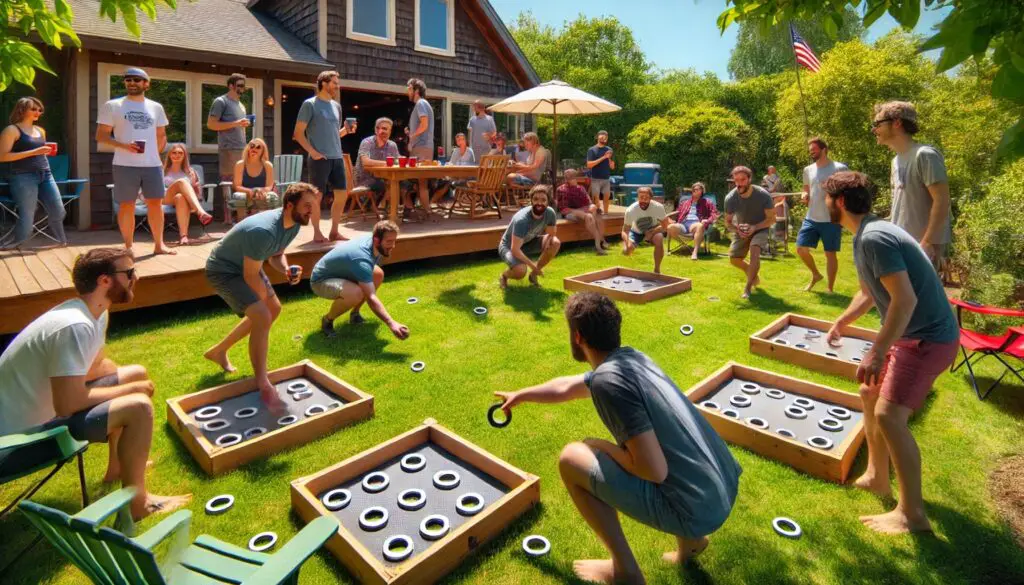The Sport of Washers: A Comprehensive Look at Its History, Popularity, and Rules

When it comes to backyard games, few are as captivating as Washers. This game, which blends strategy, precision, and a touch of friendly competition, has grown from humble beginnings into a celebrated pastime across various regions. Washers offers a simple yet engaging activity that is accessible to all ages, making it a favorite for gatherings. From its origins to its impact on communities and its rules, the sport of Washers has much to offer enthusiasts and curious newcomers alike.
The Origin and History of Washers
The origins of Washers are deeply rooted in simplicity and innovation. Historians suggest that the game emerged in the early 20th century, likely among miners or factory workers who sought recreation during breaks. Utilizing everyday materials, such as metal washers from their work environments and rudimentary pits dug in the ground, the game evolved as a practical and entertaining pastime.
The sport gained traction in rural areas of North America, particularly in the United States and Canada. It mirrored other popular games like horseshoes but offered a portable and adaptable alternative. Over time, regional variations developed, including differences in board design and rules. By the mid-20th century, Washers had become a staple at family reunions, neighborhood picnics, and campgrounds.
Efforts to formalize the sport took off in the late 20th century, with the introduction of standardized boards and competitive leagues. These developments paved the way for greater recognition and participation.
Global Popularity
While Washers originated in North America, its appeal has spread globally. The sport is particularly popular in countries with a strong culture of outdoor recreation. In the United States, it thrives in the Midwest and Southern regions, where community tournaments and family gatherings keep the tradition alive.
In Canada, Washers complements a thriving outdoor lifestyle, often played at lakeside cottages and camping trips. Across Europe, particularly in the United Kingdom and Germany, the game has found a niche among those who appreciate backyard sports. Australia’s outdoor-centric culture has also embraced Washers, adding it to the roster of favorite lawn games.
Social media and online communities have further expanded the game’s reach. Platforms like YouTube showcase tutorials and highlights from tournaments, while forums and groups connect enthusiasts worldwide. This digital presence has introduced Washers to new audiences, fostering its growth.
Amateur Washers: A Sport for All Ages
The amateur scene for Washers thrives because of its accessibility. Players need minimal equipment to start, making it a budget-friendly activity for families and schools. Boards or pits can be improvised, and the washers themselves are inexpensive.
Youth participation has risen due to organized efforts by schools and community centers. Physical education programs have integrated Washers into their curriculums, recognizing its value in promoting hand-eye coordination and social interaction. The game is easy to learn, ensuring inclusivity for players of varying skill levels.
Community leagues further encourage participation among amateurs. Weekly games and local tournaments provide opportunities for players to engage socially while improving their skills. Backyard games, a common entry point for many, often lead to a lifelong love for the sport.
Professional Washers Leagues
As the sport has gained recognition, professional leagues have emerged, elevating Washers to a competitive level. In North America, the National Washers Association (NWA) plays a pivotal role. It organizes regional and national tournaments, ensuring consistency in rules and fostering a competitive spirit.
Europe has also seen the rise of organized leagues, particularly in Germany and the UK. These leagues cater to dedicated players, some of whom train rigorously to refine their techniques. Annual championships draw spectators and competitors alike, creating a sense of camaraderie among participants.
Australia hosts several regional competitions that celebrate the sport’s inclusive nature. These events often coincide with larger community festivals, attracting audiences and generating interest in the game.
Despite being smaller in scale than mainstream sports, professional Washers leagues contribute to its growing prestige. Sponsorships and media coverage have begun to emerge, signaling potential for further expansion.
The Social and Political Significance
Beyond recreation, Washers holds social and cultural significance. The game fosters a sense of community, bringing people together across generations. Family members, friends, and neighbors gather around the boards, sharing laughter and stories as they play. This tradition strengthens bonds and creates lasting memories.
The sport also transcends socioeconomic barriers. With minimal costs involved, it is accessible to individuals and families from diverse backgrounds. This inclusivity has made it a symbol of unity, often bridging cultural divides.
Politically, the sport has been used as a tool for diplomacy and community outreach. Local governments and non-profit organizations have employed Washers tournaments to promote social cohesion. Fundraisers centered around the game have supported charitable causes, highlighting its role in effecting positive change.
Rules and Gameplay
Understanding the rules of Washers is essential for both casual players and serious competitors. While variations exist, the standard game is played with two boards placed 20 feet apart. Each board features a recessed cup in the center, surrounded by a flat playing surface.
Equipment Needed
- Two boards with recessed cups or pits.
- Four washers per player or team, typically 2.5 inches in diameter.
- A measuring tape to ensure accurate placement.
Setup
Players stand behind their respective boards, taking turns tossing washers toward the opposite board. The goal is to land washers in the cup or as close as possible to score points.
Scoring System
- 3 points: Washer lands in the cup.
- 1 point: Washer lands on the board but outside the cup.
- 0 points: Washer misses the board entirely.
Players or teams alternate throws, with each round consisting of all washers being tossed. The game continues until one player or team reaches a pre-determined score, usually 21.
Etiquette and Strategy
Good sportsmanship is vital in Washers, as in any sport. Players are expected to respect their opponents and adhere to the agreed-upon rules. Strategy plays a significant role, with skilled players aiming to block their opponents’ throws or knock their washers off the board.
Common Variations
Regional versions of Washers introduce unique elements, such as different board designs or scoring methods. In some areas, players use pits instead of boards, adding an extra layer of challenge.
Conclusion
The sport of Washers is much more than a simple backyard game. Its rich history, global appeal, and adaptability have solidified its place in the world of recreational sports. From its humble beginnings to its role in fostering social connections, Washers embodies the spirit of community and fun. Whether played casually among friends or in professional leagues, the game continues to bring joy to participants of all ages. With its easy-to-learn rules and low barrier to entry, it has a bright future as a beloved pastime worldwide. So grab a set of washers, gather your friends, and join the growing community of enthusiasts keeping this timeless sport alive.





